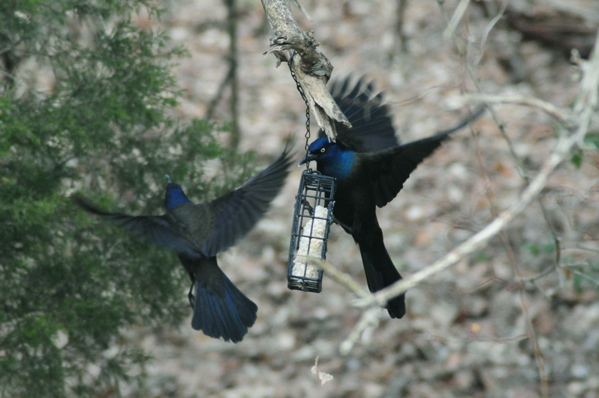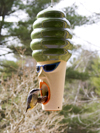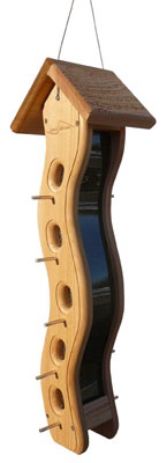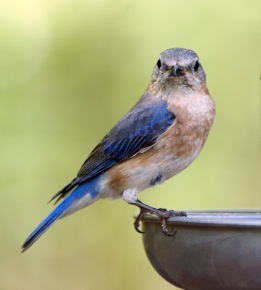-
fighting at wild bird feeders
 Some feeders are more popular than others, as are some of the bird treats offered to feathered friends. Outrage and feeding frenzies can be expected from some species, while others like Goldfinches, would rather give up & fly away than fight for a spot at at wild bird feeders.
Some feeders are more popular than others, as are some of the bird treats offered to feathered friends. Outrage and feeding frenzies can be expected from some species, while others like Goldfinches, would rather give up & fly away than fight for a spot at at wild bird feeders.These grackles are doing battle over tempting suet at this feeder. A great photo, their iridescent color is superb. Certainly not one of my favorite birds, but again a cool photo.
They are so darn smart too! If I sit outside on the deck, the Grackles will circle the perimeter of the yard, hide in the canopy and just wait to swoop down on feeders…and at my split-second departure. Upon my return, just as soon as the screen door opens… off they go. They actually sit and watch me, waiting for me to leave so they can raid the wild bird feeders. Their favorites have got to be the live meal worms (meant for the Bluebirds), Suet and Woodpecker Mix. I’ll admit it is quite the smorgasboard in our yard, and getting the good birds will inevitably attract some not-so-desirable ones too.

Speaking of wild bird feeders, have you ever seen Hilda? She’s a cool stoneware feeder that the birds just love. Filled with sunflower seed, she attracts all kinds, and the innovative design deters larger birds with its small perch. In several fun colors, she’s definitely a very wild bird feeder!
-
A Groovy kind of tube bird feeder
 You might call this a hopper type bird feeder, but it has perches and there’s no tray at the bottom. You could call it a tube bird feeder, but it really doesn’t resemble one of those either.
You might call this a hopper type bird feeder, but it has perches and there’s no tray at the bottom. You could call it a tube bird feeder, but it really doesn’t resemble one of those either.We call it the Wave Bird Feeder because of the groovy design. Hand crafted cedar and superb quality, this tube bird feeder is available for black oil sunflower and thistle seed too. With ten feeding ports and a four-pound capacity, it will entice many a feathered friend!
A quality tube bird feeder like this is a good investment for any backyard bird habitat. For use year-round, seed stays protected from the elements. If squirrels are a problem in your yard, a baffle is highly recommended to protect the feeder. Whether feeding sunflower or thistle, you can bet your birds will approve!
-
Keep that mealworm feeder filled
 For all the moms out there raising babies on their own… Happy Mothers Day!
For all the moms out there raising babies on their own… Happy Mothers Day!A Gilbertson nest box was their preference, and soon 5 Bluebird eggs sat in the nest. A pair of Eastern Bluebirds who braved a harsh winter in North Georgia found their perfect nest site. It wasn’t long at all before the eggs hatched and five babies slept comfortably in the pine straw nest. I’m not sure when the eggs were laid, but the next time the box was checked it contained the cutest naked babies.
Then some trouble for our Bluebird pair 🙁 Nothing had gotten into the box or killed the babies, it’s dad who had disappeared. With babies fully feathered now and overflowing their nest, dad had been missing for two days, at this crucial fledge time too.
The next box check revealed that mom had managed to fledge all five babies, so this gave me hope for at least a partially successfully brood. I supplemented the the worms with calcium carbonate powder to help build strong bones, and doubled the number of worms being offered in the mealworm feeder.
When raising bluebirds, both parents will feed the chicks for thirty days. Even second or third broods receive help from older siblings. Super mom was on her own, and the nasty storms during their first few nights out in the world didn’t help at all. I was like the worrisome mother. Sometimes another mate is found and the new male may or may not help to care for her brood. About two weeks after fledging, a new male was spotted gorging himself at the mealworm feeder. My only hope was that some of the worms were for the babies.
Two days ago I spotted one of the babies perched on the pole above the mealworm feeder… yellow mouth wide open and screaming his little head off! It was truly a terrific site and gave me hope that more of the five are thriving.
So, in honor of Mother’s Day… here’s to you Mrs. Bluebird! Raising babies on your own out in a tough and cold world, we wish you the best.

